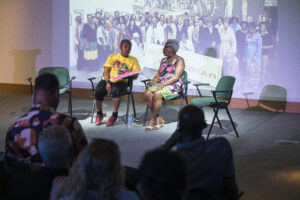On the heels of Windrush 75, British Future's Steve Ballinger looks at what anniversaries like these mean for events legacy as we look ahead to Windrush 100.

Events and anniversaries can inspire and unite – but what happens after the bunting comes down?

The 75th anniversary of the Windrush – a key moment in Britain’s history of migration and diversity – was commemorated this year as a major national event. Alongside coverage across the mainstream media, institutions from the royal family to the Football Association took part, with Windrush stamps and commemorative coins released and events held all over the country.
That didn’t happen by chance. The Windrush 75 network was set up back in early 2022 by Windrush campaigner Patrick Vernon and thinktank British Future, with the aim of ensuring that the anniversary was marked in a significant way. We saw Windrush 75 as an opportunity to communicate an inclusive history of modern Britain, highlighting the role that migration has played in shaping the society we share today. Local organisations, often rooted deeply in their communities, had been marking Windrush Day for years – the network’s role was to bring them together and amplify their voices.
By the time we marked the anniversary on 22 June this year, the network’s membership had grown to over 450 organisations and individuals, from national institutions to community groups, all committed to commemorating Windrush 75. With support from Spirit of 2012, new research into public attitudes to the anniversary and to race and diversity more broadly helped shape the approach of events organisers, and inform the discussion about race and diversity in Britain. The Windrush 75 network was awarded Community Project of the Year at November’s European Diversity Awards.
Major events and anniversaries – from the Olympics and Euros to cultural events or anniversaries of key moments in our history – can play an important role in bringing people from different backgrounds together, raising awareness of social issues and galvanising public action. But significant change doesn’t happen overnight: it often requires sustained activity over time and work to build broad coalitions of support. Organisers and campaigners need to think about legacy: what happens after a major event has passed and attention from media and stakeholders starts to wane?

This challenge was keenly felt by the Windrush 75 network. How do we keep up momentum, sustain interest and keep our coalition of support together? We did not want to give up the know-how, public cut-through and convening power of the network, only to have to start again from scratch when we mark Windrush Day next year. And this year has shown the potential to engage the public with the Windrush story, prompting big ambitions for next year, for Windrush 80 in 2028 and indeed for Windrush 100 twenty years after that.
So an event in parliament today (7 December) will see the launch of the Windrush 100 network – to build on the successes of this year and carry them into the future. It has four key objectives:
- To amplify those voices across the UK celebrating Windrush Day each year.
- To help ensure that everyone – children in schools and the wider public too – has an opportunity to learn about the Windrush and its role in shaping the society we share today.
- To capture the testimonies of the remaining members of the Windrush generation, before this important first-hand source of history and culture is lost, and promote intergenerational contact by engaging young people in documenting these stories.
- And to work together to set the agenda for action that we need today, on discrimination and equality, to achieve the Windrush centenary vision of a fair and equal Britain by 2048.
We hope that the Windrush 100 network can demonstrate some important principles for sustaining momentum and evolving activity around major events into an ongoing agenda for action. Key to that is keeping the coalition of support engaged and informed; evaluation, learning and demonstrating impact; preserving institutional knowledge; and setting out a vision for future activity towards a goal.
Our aim is for the Windrush 100 network to play an ongoing, constructive role in deepening our public conversation about race in Britain – and to drive forward a sustained agenda for long-term change.
If there is one thing we learned from Windrush 75 it’s the importance of planning well in advance. Taking this long view – as the Windrush 100 network name implies –will help us make Windrush 80 an even bigger success, as well as building strong foundations for the centenary. It also recognises that significant change on discrimination and equality will take time – but that action needs to start right now in order to achieve it.
